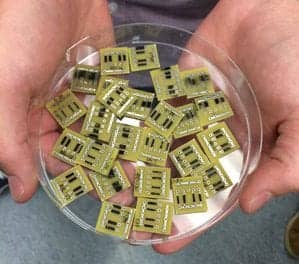Results of a University of Colorado Cancer Center study presented at the American Society for Clinical Oncology (ASCO) Annual Meeting 2014 show that a test of organic compounds in exhaled breath can not only distinguish patients with lung cancer from patients with COPD, but can also define the stage of any cancer present.
“This could totally revolutionize lung cancer screening and diagnosis. The perspective here is the development of a non-traumatic, easy, cheap approach to early detection and differentiation of lung cancer,” says Fred R. Hirsch, MD, PhD, investigator at the CU Cancer Center and professor of medical oncology at the University of Colorado School of Medicine.
The device requires blowing up a balloon, which is then attached to an extremely sensitive gold nanoparticle sensor. The particles in the sensor trap and then help to analyze volatile organic compounds in the exhaled breath. (A USB device has recently been developed, which can be plugged into a computer for rapid analysis).
Hirsch points out the need for new lung cancer screening and diagnosis tools in the context of recent lung cancer screening guidelines by the U.S. Preventative Task Force showing that screening via low-dose computed tomography can reduce disease mortality by 20 percent. However, along with more sensitive screening comes a much higher incidence of false positives, primarily in the form of non-cancerous lung nodules.









